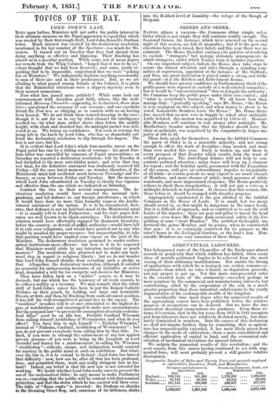TONGS OF THE DAY.
LORD JOHN'S LAST.
BENT upon bathos, Ministers will not suffer the public interest in their ultimate measure on the Papal aggression to equal that which was created by their first rough draft, Lord John Russell's Durham letter. Much interest was excited by the declaratory resolution mentioned in the last number of the Spectator—too much for Ministers. It turned out on Tuesday that they had shrunk from doing anything so effective and imposing. Their flinching has placed us in a peculiar position. While some, not of mean degree nor remote from the Whig Cabinet, "hoped that it was to be so," others thought that we had been deceived ; and some, justly regarding that to be impossible, conjectured that we were "poking fun at Ministers." We indignantly disclaim anything so cowardly to men of their size and in their predicament. But, as we are alluding to what passed among friends of the Cabinet, it is plain that the Ministerial intentions were a slippery mystery even to their nearest connexions.
Now what has passed more publicly ? While some took our announcement with Arcadian good faith, others, like the wellinformed Morning Chronicle—appearing, be it observed, three days later—questioned the accuracy of our account ; and our excellent friend the Post was so obliging as to condole with us on having been hoaxed. We do not think there is much hoaxing in the case ; though it is not for us to say by what channel the intelligence reached us—by what man, rather above than below the middle height; with cloak and slouched hat, the midnight packet was delivered to us. We betray no confidences. Not even in revenge for being left in the lurch by Lord John, who has so shamefully suffered the declaratory resolution to slip through his fingers. The loss is not ours, but his.
It is evident that Lord John's whole four-months career on the Papal point' has run by a sliding scale of courage : his great Durham letter was succeeded by rumours of Papist prosecutions ; on Saturday we reported a declaratory resolution ; but by Tuesday it had dwindled to the mere anti-titular point ; and even that was not final, for the definitive statement was studiously reserved till Friday—till the very latest moment : no wonder, therefore, if the Ministerial mind had oscillated much between November and February, or even between Friday and Tuesday. But tre measure which Lord John adumbrated on Tuesday is clearly less vigorous and effective than the one which we indicated on Saturday.
Contrast the two in their several consequences. The declaratory resolution would have asserted the national inde4iendence, and bid defiance to any foreign interference ; in which it would have done no more than formally express the loudlyuttered sentiment of the nation. It is to be remembered, however, that defiance is not an habitual mood of the Ministerial mind —it is usually left to Lord Palmerston ; and his state paper defiances are well known to be blank-cartridges. The declaratory resolution would have effectually stimped the Romanist hierarchy, before the country, as devoid of public authority—would have left it to rule over volunteers, and would have pointed out to any who might be assailed the proper recourse : but unquestionably, to take that position would have implied some vigour on the part of the Ministry. The declaratory resolution promised to render ecclesiastiCal institutions more efficient : but how is it to be expected that Ministers would abide by any intention involving so much mastery ? The resolutions also promised not to make any backward step in regard to religious liberty : but we do not wonder that Lord John Russell shrinks from recording such a pledge as that. Altogether, the declaratory resolution, although it entailed no necessity for embarrassing measures of an initiative or active kind, demanded a will far too energetic and decisive for Ministers. They have fallen back on a "milder" course, as it may be deemed; but one which has the tendency of all weak courses, to be either a nullity or a tyranny. We may remark that the whole drift of Lord John's career has been to put the Roman Catholic Prelates on their guard, by holding out large and formidable threats at first, and then, by flinching from such advanced position, it has left the well-reconnoitered ground free to the enemy. The "insidious" invaders will be at once stimulated to the highest degree of watchfulness and encouraged to make new encroachments. For the proposed law "to preventthe assumption of certain ecclesiastical titles" must be an idle law. Prohibit Cardinal Wisemat from calling himself Archbishop of Westminster, and what do you effect? You force him to sign himself + Nicholas Wiseman," instead of "Nicholas, Cardinal, Archbishop of Westminster" ; but you do not prevent everybody from calling him by that title. In
if you were to attempt the enforcement of any law against private persons—if you were to bring up Mr. Langdale or Lord .Arundel and Surrey for a misdemeanour in calling Dr. Wiseman "Archbishop "—ridicule, shame, and indignation would contend for mastery in the public mind at such an exhibition. • But whatever the law is, it is to extend to Ireland—Lord John has braved that difficulty : now, how can he, after all that has been professed, done, and permitted there, work any really stringent law in Ireland ? Indeed, our belief is that the new law is not intended for working. We doubt whether Lord John really cares to prevent the use of the ecclesiastical titles : he only means to make Parliament say so; expecting that the public will be content with that nominal protectien, and that the storm which he has excited will blow over. The fable of "Rana rupta " is inverted : the Durham ox shrinks to the Downing Street frog, and, conscious of its littleness, slinks
into the Bedford level of humility—the refuge of the Slough of Despond.


























 Previous page
Previous page